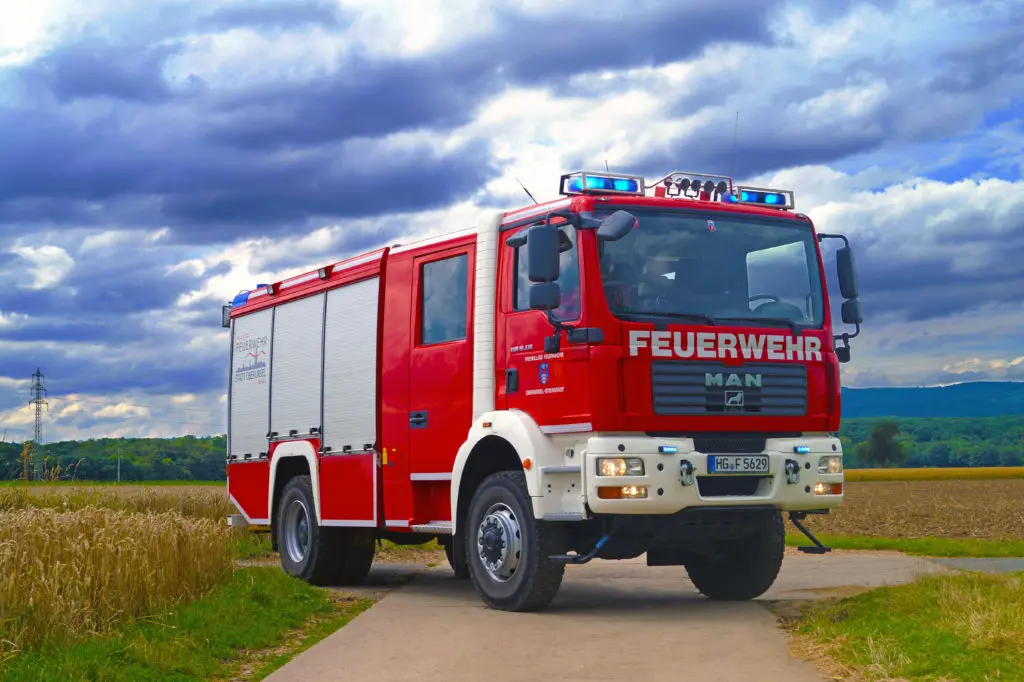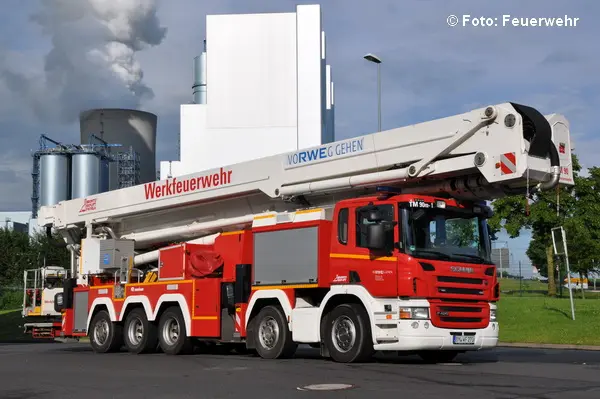Okay, but look how short that is compared to the American equivalent:
More specialized departments close to industrial facilities, airports can be also much bigger. This one is currently the biggest weighting 52 tons.
Okay, but look how short that is compared to the American equivalent:
The longer the truck is, the larger the turning radius it needs at intersections. The larger the intersections are, the faster regular cars drive through them. The faster the cars drive, the less safe it is for everybody else.
Deciding how large a vehicle a street should accommodate is called choosing the design vehicle. You pick that, and then the whole street is designed around it.
Guess what: here in the US, we often send even trucks like the second one I pictured – the one that’s even longer than your “industrial facility and airport truck” – to residential neighborhoods. Fire departments want to own trucks like that and we just fuckin’ let them. And that’s why our neighborhood streets are too often designed like goddamned airport runways!
Edit: Oh, and by the way…
I agree that the US have way too many way too big trucks but this…
Ambulances and firetrucks in Europe and Asia are smaller than most american pickup trucks.
… is just wrong.
The MAN TGM 18.330 you cited has a wheelbase of 3,900/4,200/4,500 mm (source).
A Ford F-150 Super Crew with an 8’ bed and an F-250/F-350 Crew Cab with an 8’ bed, both of which are considered pretty typical American pickup trucks, have wheel bases of 163.7" (4158mm) and 176.0" (4470mm) respectively (source).
He’s playing a little fast and loose with the notion of “most,” but otherwise, no, he’s actually not wrong!
Here in 'Murrica, they send something like in the second photo when grandma falls in the bathroom.
Yes, I’m exaggerating, but not by much. The truck in the first photo is smaller than the trucks my city fire department has. There’s a retirement community not far from where I live, and they send a ladder truck for medical emergencies there several times a week. I’m not really sure what use 4,000 liters of water would be when somebody is having a stroke.
I’m not really sure what use 4,000 liters of water would be when somebody is having a stroke.
They send a firetruck if someone is having a stroke? Isn’t there a dedicated ambulance for such cases? A ladder truck might make sense to get patients out of a big building but other than that that? Or do they have just one single vehicle that they use for all purposes?
Watch the Not Just Bikes video, if you have the time and interest. The short answer is: yes. The trucks are enormous because they carry all the equipment for any sort of emergency, so they send the big trucks to every call. Not every fire station has an ambulance unit, so the trucks can get to many locations more quickly.
Weight doesn’t matter in this context? US firetrucks are almost a meter wider than german ones. A german firetruck is only about half a meter wider than a Ford F450.
And also firetrucks in US are first responders, they go before ambulances for most emergencies.
Unless they have some sort of advanced materials science in other countries we don’t know about here in the US that makes them as light as cardboard, I’d bet my year’s salary you wouldn’t volunteer to let one hit you.
And yes, I have been out of the US. Shall I tell you what we say about those who “assume” things over here?
North america is the only place where the trucks are this wide, and where the firedept has the power to regulate the size of infrastructure (and where bike lanes can be) for their increasingly large trucks.
But don’t watch the video or anything, keep arguing your ignorance.
Your comment said uniquely north american. I even edited my comment to say North American to match your language since I initially did say US.
When I came into this thread, you may have noticed I was replying to you and your assertion that pedestrians outside North America don’t get injured by heavy metal objects. I don’t care how compact your vehicles may be, a hunk of solid metal in motion is going to injure a squishy human being.
Other countries have separate lanes for bikes, less open space for cars and parking (fire dept in the US regulates the minimum space needed for their large trucks).
Guess what, when the bike isnt on the same road as the hunk of metal, they don’t get hit. Weird i know. Dont watch the video though!!
(Canada has similar shitty emergency vehicle rules, it’s a north american thing)
None of which is anything I’m disagreeing with or have mentioned. Again, your comment I originally replied to was implying because you don’t have giant vehicles people don’t get injured by vehicles. I don’t need to watch the video because I was replying to you and the nonsense implication of your statement.
Tell me youve never been in another country without telling me youve never been in another country.
Ambulances and firetrucks in Europe and Asia are smaller than most american pickup trucks.
I agree that the US have way too many way too big trucks but this…
… is just wrong. I live in Germany and even small villages with only volunteer firefighters have full blown trucks way above 10 tons.
Most fire departments have something like this:
MAN TGM 18.330 Tank with 4,000 litres of water 18 tons total weight
More specialized departments close to industrial facilities, airports can be also much bigger. This one is currently the biggest weighting 52 tons.
Okay, but look how short that is compared to the American equivalent:
Okay, but look how short that is compared to the American equivalent:
The longer the truck is, the larger the turning radius it needs at intersections. The larger the intersections are, the faster regular cars drive through them. The faster the cars drive, the less safe it is for everybody else.
Deciding how large a vehicle a street should accommodate is called choosing the design vehicle. You pick that, and then the whole street is designed around it.
Guess what: here in the US, we often send even trucks like the second one I pictured – the one that’s even longer than your “industrial facility and airport truck” – to residential neighborhoods. Fire departments want to own trucks like that and we just fuckin’ let them. And that’s why our neighborhood streets are too often designed like goddamned airport runways!
Edit: Oh, and by the way…
The MAN TGM 18.330 you cited has a wheelbase of 3,900/4,200/4,500 mm (source).
A Ford F-150 Super Crew with an 8’ bed and an F-250/F-350 Crew Cab with an 8’ bed, both of which are considered pretty typical American pickup trucks, have wheel bases of 163.7" (4158mm) and 176.0" (4470mm) respectively (source).
He’s playing a little fast and loose with the notion of “most,” but otherwise, no, he’s actually not wrong!
Here in 'Murrica, they send something like in the second photo when grandma falls in the bathroom.
Yes, I’m exaggerating, but not by much. The truck in the first photo is smaller than the trucks my city fire department has. There’s a retirement community not far from where I live, and they send a ladder truck for medical emergencies there several times a week. I’m not really sure what use 4,000 liters of water would be when somebody is having a stroke.
They send a firetruck if someone is having a stroke? Isn’t there a dedicated ambulance for such cases? A ladder truck might make sense to get patients out of a big building but other than that that? Or do they have just one single vehicle that they use for all purposes?
Watch the Not Just Bikes video, if you have the time and interest. The short answer is: yes. The trucks are enormous because they carry all the equipment for any sort of emergency, so they send the big trucks to every call. Not every fire station has an ambulance unit, so the trucks can get to many locations more quickly.
It’s ridiculous.
Weight doesn’t matter in this context? US firetrucks are almost a meter wider than german ones. A german firetruck is only about half a meter wider than a Ford F450.
And also firetrucks in US are first responders, they go before ambulances for most emergencies.
Unless they have some sort of advanced materials science in other countries we don’t know about here in the US that makes them as light as cardboard, I’d bet my year’s salary you wouldn’t volunteer to let one hit you.
And yes, I have been out of the US. Shall I tell you what we say about those who “assume” things over here?
Clearly you didnt watch the video, because you couldn’t be more wrong. This is uniquely a north american thing
lol, right, pedestrians getting injured/killed by cars is uniquely North American. OK buddy.
North america is the only place where the trucks are this wide, and where the firedept has the power to regulate the size of infrastructure (and where bike lanes can be) for their increasingly large trucks.
But don’t watch the video or anything, keep arguing your ignorance.
Your comment said uniquely north american. I even edited my comment to say North American to match your language since I initially did say US.
When I came into this thread, you may have noticed I was replying to you and your assertion that pedestrians outside North America don’t get injured by heavy metal objects. I don’t care how compact your vehicles may be, a hunk of solid metal in motion is going to injure a squishy human being.
Other countries have separate lanes for bikes, less open space for cars and parking (fire dept in the US regulates the minimum space needed for their large trucks).
Guess what, when the bike isnt on the same road as the hunk of metal, they don’t get hit. Weird i know. Dont watch the video though!!
(Canada has similar shitty emergency vehicle rules, it’s a north american thing)
None of which is anything I’m disagreeing with or have mentioned. Again, your comment I originally replied to was implying because you don’t have giant vehicles people don’t get injured by vehicles. I don’t need to watch the video because I was replying to you and the nonsense implication of your statement.
" i dont need your full argument".
Okkkay